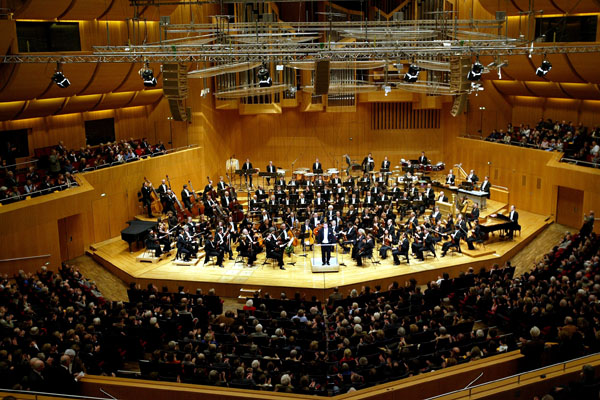
The Munich Philharmonic Orchestra was founded in 1893 on the initiative of Franz Kaim, the son of a piano-manufacturing factory owner, and was initially known as the Kaim Orchester. From the first years of its existence, it was directed by such renowned conductors as Hans Winderstein, Herman Zumpe and Bruckner's student Ferdinand Löwe. Thanks to this, the orchestra was able to demonstrate a high level of performance, and its repertoire was incredibly wide, including a huge number of works by contemporary composers.
From the very first, another important part of the orchestra's artistic conception was its wish to make its concerts accessible to all members of society, thanks to programmes of introductions and its democratic pricing policy.
Between 1901 and 1910 the orchestra first performed Gustav Mahler's Fourth and Eighth Symphonies. The premieres were conducted by the composer himself. In November 1911, half a year after Mahler's death, the orchestra under Bruno Walter first performed Mahler's Song of the Earth. Not long before, the ensemble had been renamed the Concert Society Orchestra.
From 1908 to 1914 the orchestra was directed by Ferdinand Löwe. On 1 March 1898 in Vienna, he conducted a triumphal performance of Bruckner's Fifth Symphony. Ferdinand Löwe was later to conduct works by Bruckner several times, and he established the tradition which exists to this day of performing this composer's symphonies.
During Siegmund von Hausegger's term as Music Director of the orchestra (1920-1938), the ensemble was renamed the Munich Philharmonic Orchestra. From 1938 to 1944, Austrian conductor Oswald Kabast headed the orchestra, brilliantly developing the tradition of performing Bruckner's symphonies.
The first concert following World War II was opened by Eugen Jochum with Felix Mendelssohn's overture to Shakespeare's A Midsummer Night's Dream, his music having been banned during the period of Nazi rule. In the post-war years, the orchestra has been conducted by such outstanding maestri as Fritz Rieger (1949-1966) and Rudolf Kempe (1967-1976).
In February 1979, Sergiu Celibidache conducted his first series of concerts with the Munich Philharmonic. In June the same year, he became the ensemble's Music Director. Together with Sergiu Celibidache, the Munich Philharmonic toured to many cities throughout Europe as well as to South America and Asia. Performances of Bruckner's works were acclaimed as "classical" and to a significant degree raised the international status of the orcestra.
From September 1999 to July 2004, the Munich Philharmonic Orchestra was directed by James Levine. Together with him, the orchestra's musicians completed extensive tours of Europe and America. In January 2004 for the first time in history, maestro Zubin Mehta became the orchestra's Guest Conductor.
In May 2003 Christian Thielemann was appointed the ensemble's Music Director. On 29 October 2004, he conducted Anton Bruckner's Fifth Symphony. On 20 October 2003, the Munich Philharmonic Orchestra had the honour of performing before Pope Benedict XVI at the Vatican. The concert was heard by an audience of seven thousand specially invited guests and the conducting stand was occupied by Christian Thielemann.
| Co-funded by |  |
